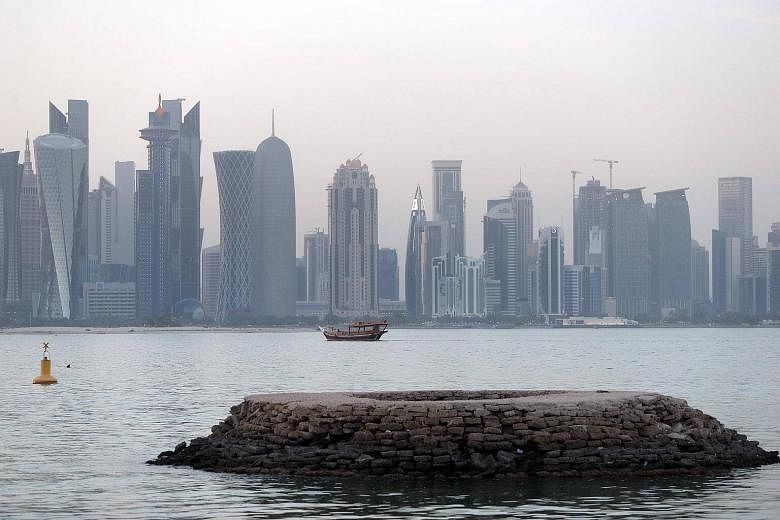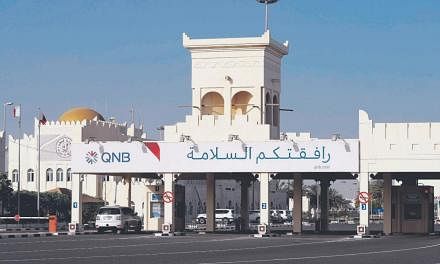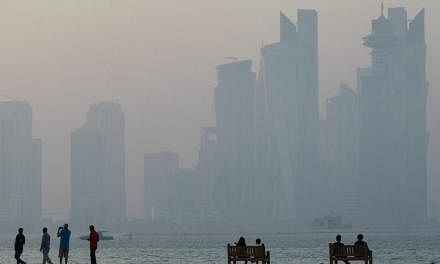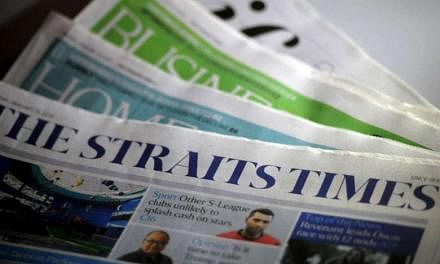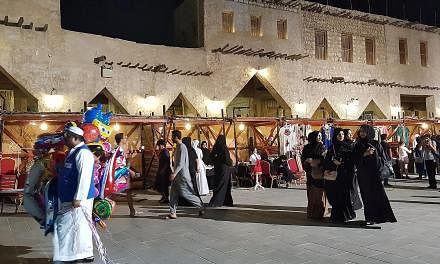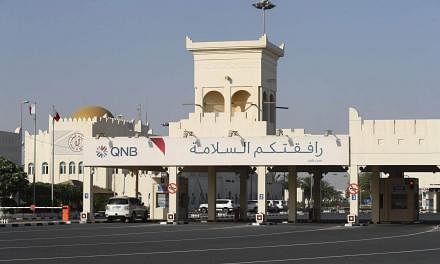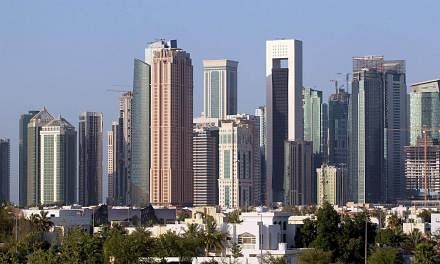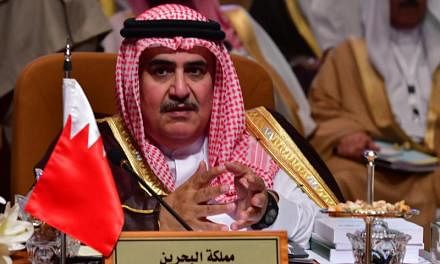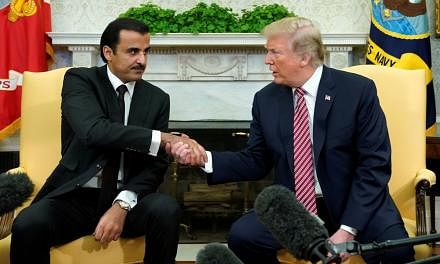DOHA - It has been more than a month since Saudi Arabia, the United Arab Emirates (UAE), Bahrain and Egypt separately announced on June 5 that they were breaking off diplomatic relations with Qatar.
The four countries, accusing Doha of supporting "extremism and terrorism", meddling in their internal affairs and cozying up to their rival Iran, have also imposed a sweeping air, sea and land blockade against Qatar. The four-nation bloc has issued a list of 13 demands for Qatar including closing broadcast giant Al-Jazeera, downgrading ties to Shia-majority Iran and shutting a Turkish military base in the emirate. Qatar have denied all the charges.
Qatar, with its deep pockets, appeared to have circumvented the embargo relatively well.
Here's a look at how the tiny Gulf nation is responding to the sanctions.
MONEY POWER
Home to around two million people, out of which around 300,000 are citizens, Qatar has the world's highest per capita at US$129,726 (S$177,659).
Its central bank governor Sheikh Abdullah Bin Saoud al-Thani has said the country has US$340 billion in reserves that could help it weather the isolation by its powerful Arab neighbours.
"This is the credibility of our system, we have enough cash to preserve any... kind of shock," he told the CNBC news channel in an interview published on July 10 on its website.

Al-Thani said the central bank has US$40 billion in reserves plus gold, while the Qatar Investment Authority sovereign wealth fund has US$300 billion in reserves that it could liquidate, according to a Reuters report.
He also said the stability of the Qatari riyal, which is pegged to the US dollar, will "continue for the future."
FOOD SUPPLIES UNAFFECTED

In the shock of the first days of the crisis, there was panic-buying and a very real fear of food shortages, but supermarket shelves in the arid emirate are now full and well-stocked with fresh produce and imports from Turkey and Iran.
Exports from Turkey to the Gulf state have tripled from their normal levels to US$32.5 million since the sanctions, Turkish Customs and Trade Minister Bulent Tufenkci said.
Iran sends about 1,100 tonnes of fruit and vegetables each day by sea, Iran's Fars news agency reports.
Last week, in the first of 60 flights that will bring more than 4,000 cows to the country, 165 cows were flown from Budapest in a Qatar Airways cargo plane. The cattle will be brought in from the US, Australia and Germany and kept in air-conditioned hangars in the desert.
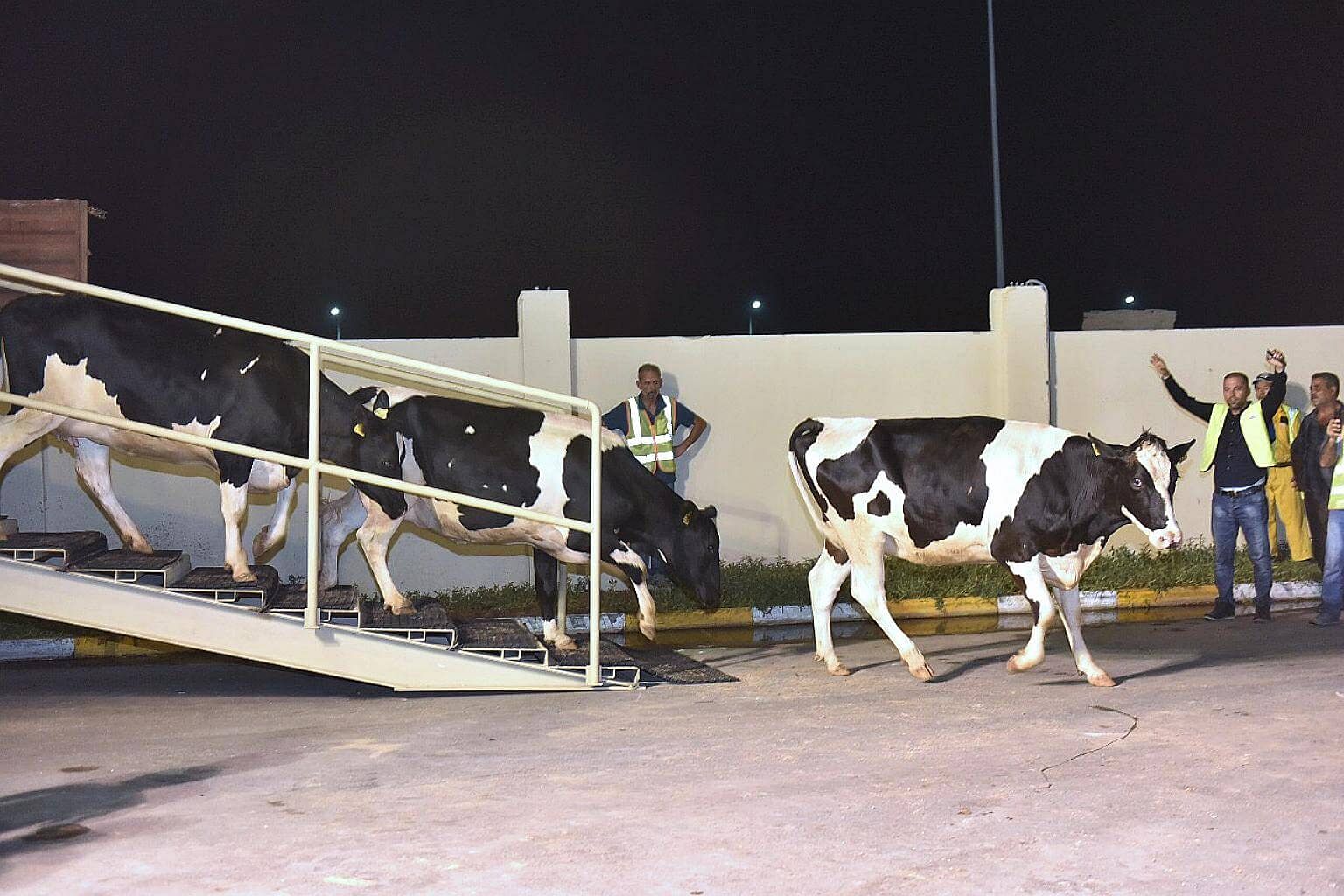
They are being imported by Doha businessman Mountaz Al Khayyat, who saw an opening in the dairy industry after the blockade severing the supply of fresh milk from Saudi Arabia.
"This is the time to work for Qatar," Al Khayyat told Bloomberg News.
Residents of the emirate have learned to adapt to the daily realities of living with the embargo. Prices for staples have increased, but most shrugged off the extra expenses.
"The government has found alternatives and there is no problem (of shortages)... despite a slight price increase we can cope," says Mohammed al-Chib, shopping at a Doha supermarket.
Qatari resident Umma Issa told Bloomberg: "Our government has made sure we have no shortages and we are grateful for that. We have no fear. No one will die of hunger."
#DOHAUNDERSIEGE CAMPAIGN
A satirical Twitter account called DohaUnderSiege has been set up for people to share pictures and messages on how their daily lives have been affected - or not - by the sanctions.
"Scared to leave hotel today. Omelette bar at breakfast buffet officially out of chives. Had to trade Rolex for decent espresso," reads one of the post with the hashtag #DOHAUNDERSIEGE.
Qatar Airways boss Akbar Al-Baker said recently: "All the people have a normal life, all the supplies are available, actually more than what it was before, so what is the problem?"
"We need our neighbours to know that this kind of bullying doesn't work because the people of Qatar are very robust and we have no issue to have our normal life.
LNG EXPORTS UNINTERRUPTED
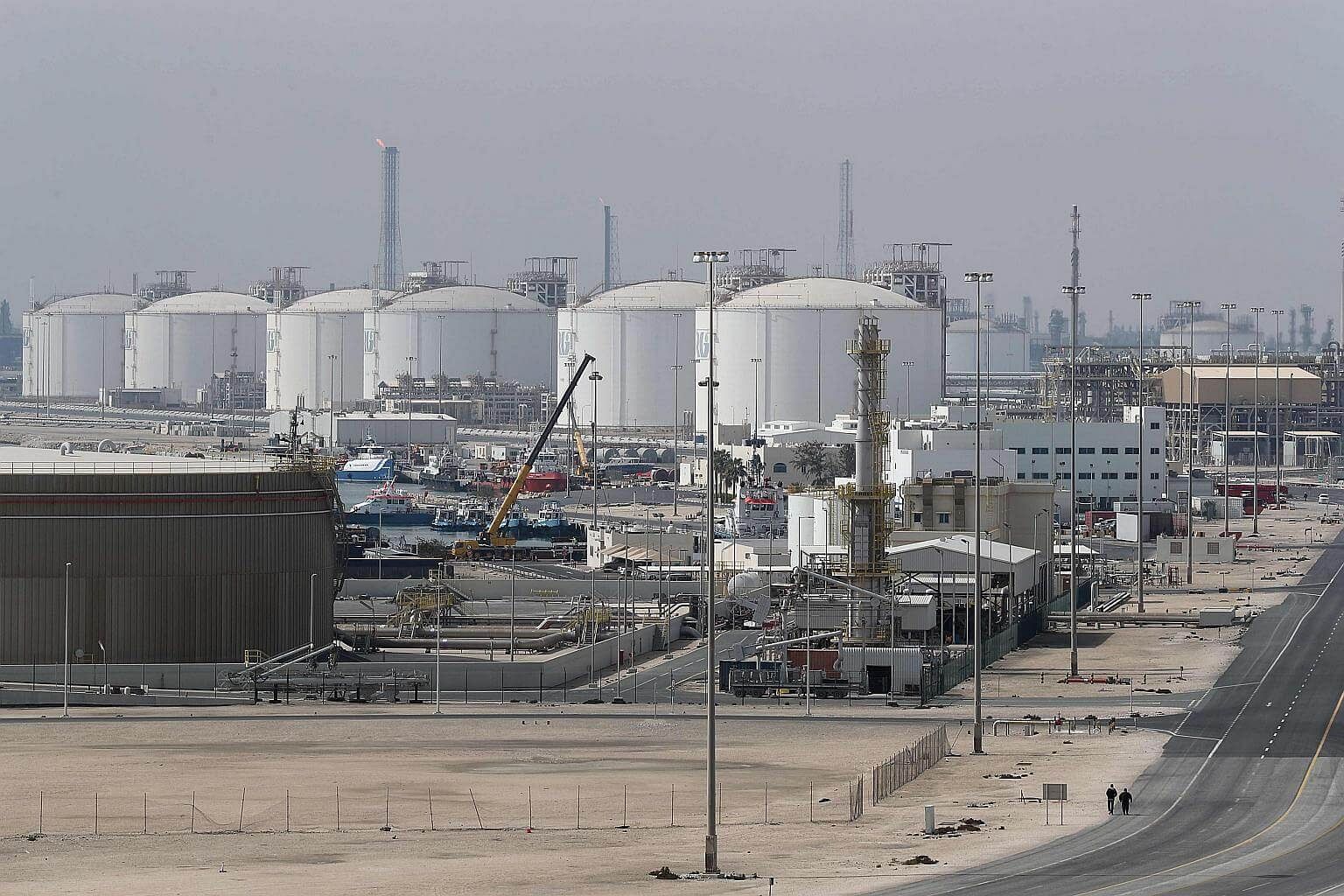
Qatar, which shares the world's third-largest gas field with Iran, is the world's biggest exporter of liquid natural gas, which has continued to flow uninterrupted even as the crisis deepens.
Roughly two-thirds of the nation's exports are sent to Japan, South Korea, India, Taiwan, China, and Thailand.
"If Qatari gas exports were to be blocked, countries like Britain, Japan, South Korea and China would have an energy crisis and would have to scramble to get their energy elsewhere," said Kristian Coates Ulrichsen, a Seattle-based research fellow at the James A. Baker III Institute for Public Policy at Rice University who has extensively studied Qatar, told Associated Press.
"For any small country, particularly a small country in the Gulf surrounded by much larger and potentially expansionary powers, having international partnerships is a key tool of your external security," he said. "I think that may be what the Qataris are banking on right now."
MEDIA FIGHTS BACK
Al Jazeera Media Network, parent company of Al Jazeera and its related networks, has launched a social media campaign demanding Press Freedom in response to the demand by the Saudi-led bloc that Qatar shut down Qatari-funded Al Jazeera and all of its affiliates.
Gulf countries and Saudi Arabia's close ally, Egypt, have long accused the popular satellite broadcaster of providing a platform for Islamist movements and encouraging dissent - claims the broadcaster has denied, reported BBC News.
In a statement, Al Jazeera said, "We assert our right to practise our journalism professionally without bowing to pressure from any government or authority."
The media company's social media campaign has reached more than 53 million views and engagement on twitter, Facebook and YouTube in the first week alone, with 32 million views of the aligned campaign video since its launch on July 3.
The campaign video was produced in Arabic, English, Bosnian and Spanish, showing Al Jazeera presenters and correspondents requesting demands pertaining to media freedom, which "aim to challenge the rising antagonistic statements issued by the blockading countries against freedom of expression in the region, including the illogical demand to close Al Jazeera and terminate broadcast as a precondition to lift the blockade on Qatar".
NEW AIR AND TRADE ROUTES
Among the sanctions imposed by Qatar's neighbours was a decision to close the airspace of the countries to Doha-based Qatar Airways. This means the carrier can no longer continue its lucrative services to Dubai and Saudi Arabia, and has to divert some flights on longer routes because of airspace restrictions.
Iran has also opened its airspace to flights to and from Qatar, which has been banned from using Saudi and other countries' airspace.
On July 3, Qatar Airways announced that would start flights to Sohar in Oman and Prague, the first new routes to be announced by the airline since the crisis forced it to stop flights to 18 Middle East destinations.
Qatar Airways boss Akbar Al-Baker has said it was "business as usual" for Qatar Airways despite the cutting of ties by the four states, although he has acknowledged there has been a financial impact.
"It has to (affect profits) because we have additional costs to operate in and out of the country," he was quoted as saying by Agence France-Presse.
The restrictions have doubled the flying time on some routes, he said in a Bloomberg report last month (June).
One Jordanian national complained he had "spent six hours in transit" at Muscat airport for a flight from Amman to Doha, via Oman, because of the flight restrictions imposed by the embargo, reported AFP.
Qatar Airways, one of the region's biggest airlines, recently won "World's Best Airline," "World's Best Business Class," "Best Airline in the Middle East," and "World's Best First Class Airline Lounge" awards by Skytrax. It operates 200 aircraft, including 21 cargo planes.
Qatar has also launched five new shipping routes to circumvent the trade blockade: Two to India, Two to Oman, and one to Turkey.
POSSIBLE DELAYS TO FIFA 2022 WORLD CUP

Qatar plans to build eight world-class football venues, create 60,000 new hotel rooms and finish a metro system for Doha, at a combined cost of more than US$150 billion, as it prepares to host the world's biggest single-event sporting competition in 2022.
Andrew MacCuish, a Dubai-based partner at international law firm Kennedys, told Arab News: "It was always seen as a tight timetable, and it has just got tighter."
More than half of Qatar's raw materials for construction arrive by road, but the only road in is through Saudi Arabia, which is now closed.
This means supplies needed for eight stadiums and other associated infrastructure must come through the bottleneck of the recently completed Hamad Port, reported Arab News.
But Qatari Foreign Minister Sheikh Ahmed bin Jassim Al Thani told Al Jazeera earlier this month: "Even if we don't import or export for the next year, we have enough materials to cover our infrastructure and private sector projects."
The wealthy Arab state relies mainly on foreign labour for the construction projects which reports say are at risk of being delayed. The Diplomat website said in a recent article that the Philippines temporarily stopped Filipino workers from travelling to Doha; Vietnam has also reportedly suspended workers from travelling to the emirate.
Qatar, said The Diplomat, is seeking to prevent some guest workers in vital industries from leaving during the embargo as well.
IMAGE OF EMIR AS SYMBOL OF DEFIANCE

A stencil-style image of the Emir - Sheikh Tamim Bin Hamad al-Thani - is now almost everywhere - on social media profiles, large posters on the streets and on the city's high-rise towers, on T-shirts, on cars and, the latest, unveiled by Qatar Airways.
Qataris young and old show up at the billboards and walls to sign their messages of support to their leader, according to media reports and CNN.
The Qatari artist behind the viral image of the Emir that has been plastered on cars, walls and t-shirts across the country said he is "grateful" his work is so popular.
"It's my duty, the least I can do, as a Qatari creative artist to show my support and stand by the Emir," Ahmed Almaadheed told Doha News.
He said that the drawing had actually started out as car art for Qatar National Day and he recreated it on a canvas at the beginning of the crisis last month (June). The image has since gone viral - both online and offline.
Sources: Bloomberg, Agence France-Presse, Reuters
